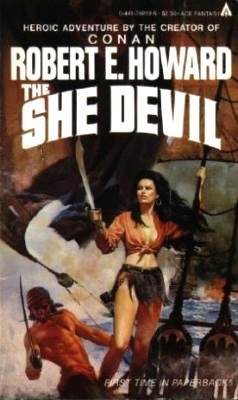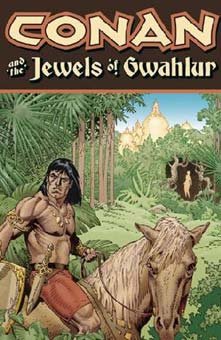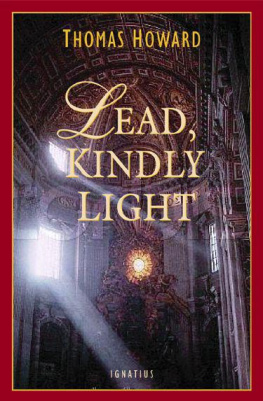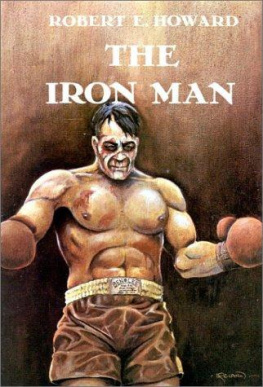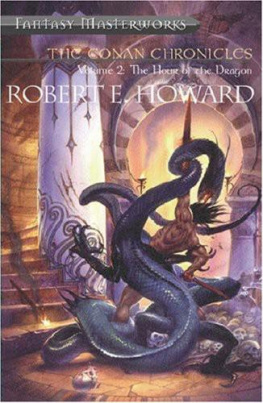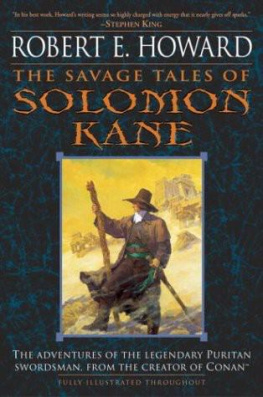Robert E. Howard
Sword Woman and Other Historical Adventures

This book is dedicated to my deceased wife, Lorraine, who Im sure would have been pleased that I finally got to illustrate a book by such a great writer.
John Watkiss
Touch it not, exclaimed Asmund
His mighty right hand held ready the stained sword
Cormac thundered his battle cry
They have crossed the Jordan!
We fell to it, thrusting, slashing
So I gave the horse the rein and rode at a reckless gallop
Robert E. Howards crowning glory in literature was Conan the Cimmerian. His epic tales written from a remote place in Texas were remarkable in character, landscape, and mood.
At the age of fourteen, I first came across his stories in paperback editions. At that time, as a young artist, I had been studying anatomy with regard to drawing the human figure. The exotic, mysterious, action-packed stories of the Conan saga were a perfect vehicle for inventive figure renditions and stagings.
At that time I could only dream about working on Howards stories. Now I have realized that dream, illustrating Sword Woman and Other Historical Adventures.
I hope you enjoy Howards work as much as I enjoyed illustrating it.
John Watkiss 2010Historical fiction has been a part of our literary heritage for almost as long as we have possessed the written word, since some forgotten scribe in the court of Rameses XI put pen to papyrus to create the Report of Wenamon. Over the centuries it became the province of skalds and poets; bards and playwrights plundered whole archives to find fodder for the ages, while historians and antiquarians used fictionalized history as a means of understanding long-vanished civilizations. Today, while its form and function as a genre has changed, the appeal of historical fiction remains undiminished. It is the literature of spectacle and pageantry; at its simplest it is pure entertainment wrapped in a veneer of respectability often denied to its close cousin, fantasy. In the hands of a master, however, historical fiction does more than entertain it puts a distinctly human face on our collective past.
Robert E. Howard (19061936) was such a master. Though his professional career spanned but a little more than a decade, he wrote, by conservative estimate, some three million words of poetry and prose, much of it having an historical slant. Indeed, a love of times past ran deep in Howards veins; a survey of his correspondence reveals that virtually every letter between 1923 and 1936 makes some mention of his interest in things historical from the Celtic migrations to the lives of local gunfighters. With this in mind, its relatively easy to make the case that even Howards non-historical writings, his tales of Conan of Cimmeria or Kull of Atlantis, are at heart historical fiction. Who can read Black Colossus, for instance, and not see the shadow of the Kingdom of Jerusalem in the plight of the tiny city-state of Khoraja? Does not the blood-feud in Red Nails echo the equally bloody Lincoln County War? Such parallels abound in Howards fiction some tenuous, others flare-bright and obvious.
The stories collected in this volume, however, are solidly historical. They owe their genesis to Howards literary patron and Weird Tales editor Farnsworth Wright, who solicited the young Texan in the summer of 1930 to contribute to his newest pulp magazine, Oriental Stories: I especially want historical tales, Wrights letter stated, tales of the Crusades, of Genghis Khan, of Tamerlane, and the wars between Islam and Hindooism. This was a welcome opportunity for Howard, and he seems to have wasted little time in acting upon it.
There is no literary work, to me, half as zestful as rewriting history in the guise of fiction, he commented in a letter to H. P. Lovecraft. And indeed, Howards zest, his passion, is evident in every detail and turn of phrase. These stories rank among REHs finest lean and descriptive, with headlong plots and a rogues gallery of characters who embody the kind of grim fatalism that has become a hallmark of his work. They span the breadth of the Middle Ages from war-torn eleventh-century Ireland (Spears of Clontarf) to sixteenth-century Ottoman Crimea (The Road of the Eagles) and they explore a similar theme, what Howard called his continual search for newer barbarians, from age to age. The violent clash of civilizations and its tragic consequences fascinated Howard, as did the stoic heroism that arises in the face of inescapable doom. These themes crop up often in REHs oeuvre, in the travels of Solomon Kane, in the knifes-edge maneuverings of Francis Xavier Gordon, and in the determined resistance of Bran Mak Morn. But here, in his stories of Outremer and the Old Orient, Howard most eloquently questions the dominance of barbarism over civilization a question he would ultimately answer in 1934, in the final paragraph of one of his most celebrated tales, Beyond the Black River:
Barbarism is the natural state of mankind civilization is unnatural. It is a whim of circumstance. And barbarism must always ultimately triumph. Though passionate about his material and confident in his ability to spin a yarn, Howard nonetheless felt that the writing of historicals exposed one of his great faults to the world: My knowledge of the Orient is extremely sketchy, and I have to draw on my imagination to supply missing links which I cant learn in the scanty references at my command. And though he seems to have considered the introduction of imagination into historical fiction to be a weakness, it is that selfsame imagination that gives these stories such a dramatic flair. Howards prose has the power to bring history to life grim and vicious life, but life all the same; he had a poets eye for evoking sensations that surely must have existed, even if no mention is made of them in the historical narrative from the color of the night sky over a sacked and burning citadel to the taste of blood and gunpowder to the bitter stink of death that hangs in the morning air. When woven into the skein of history, these dollops of imagination elevate the rote recitation of dates and deeds into a potent form of art.
Howard bolstered his imagination by reading, widely and voraciously no mean feat in Depression-era rural Texas. In his ongoing correspondence with fellow Weird Tales author H. P. Lovecraft, Howard lamented the dearth of culture in West Texas, stating that it is almost impossible to obtain books on obscure and esoteric subjects anywhere in the state. Despite the difficulties, Howard amassed a vast store of historical knowledge, both for the American Southwest and for lands far-flung. He counted Sir Walter Scott among his favorite authors, along with Talbot Mundy, Stanley Lane-Poole, and the much-esteemed Harold Lamb. And from every one, both fiction and nonfiction, he took away something with which to inform his own work.
Absent first-hand experiences garnered through travel, or the where-withal to perform ones own research in situ, cannibalizing and absorbing the works of others is a time-honored tradition among writers. Every book, story, and article one reads has the potential to supply a phrase or fact, a description or a bit of color. Of course, we should not confuse this with plagiarism; a good author and Howard was one of the best takes only inspiration, recasting the actual words to suit his own voice, his own style.


